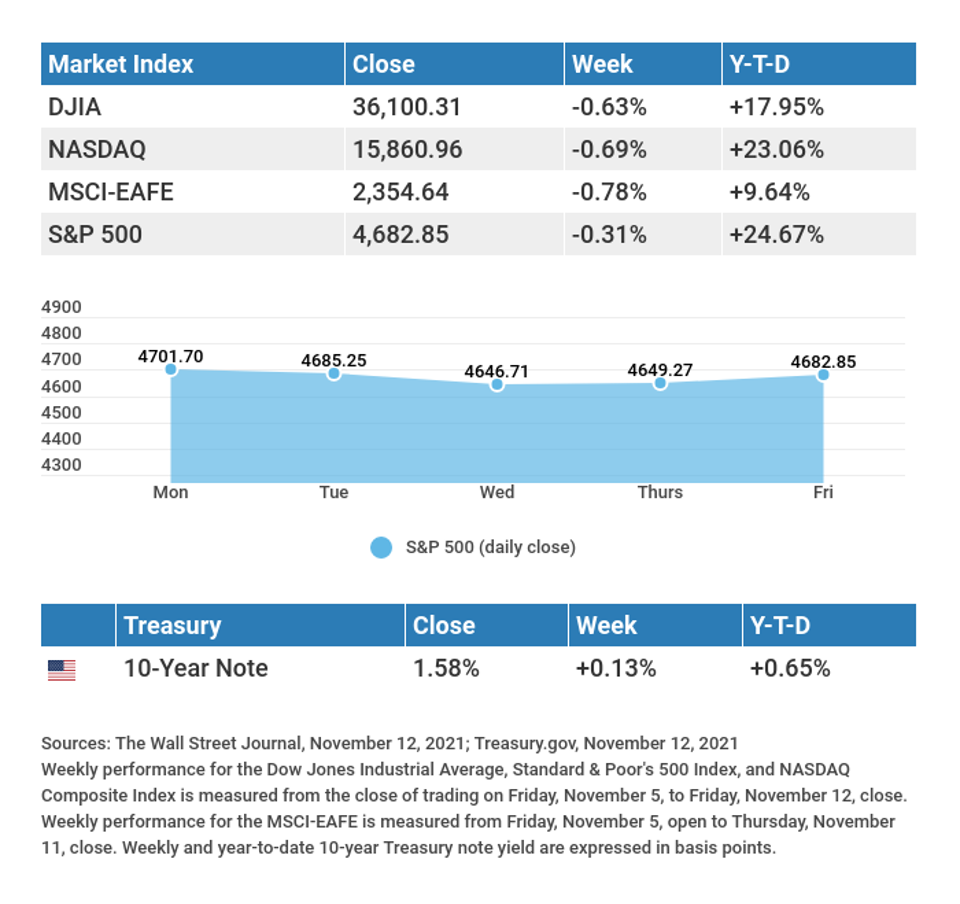In this week’s recap: Stocks tap the brakes after signs of higher inflation.
Weekly Economic Update
Presented by Jon Robertson, November 15, 2021
THE WEEK ON WALL STREET
Stocks posted small declines last week as investors digested recent stock market gains and an unexpectedly high inflation read.
The Dow Jones Industrial Average slid 0.63%, while the Standard & Poor’s 500 retreated 0.31%. The Nasdaq Composite index slipped 0.69% for the week. The MSCI EAFE index, which tracks developed overseas stock markets, dropped 0.78%.1,2,3
MARKET TAKES A PAUSE
After moving higher on Congressional approval of a $1 trillion-plus infrastructure spending bill, stocks drifted lower as investors took a breather after a weeks-long run-up in prices. A high October inflation report on Wednesday sent bond yields higher and stock prices lower, especially technology and other high growth companies. Energy also fell.4,5
Higher-than-expected inflation elevated investor worries that the Fed may be forced to accelerate its bond tapering schedule and hike interest rates sooner than planned. Stocks found firmer footing following the inflation-related sell-off, closing the week on a strong note, though it wasn’t sufficient to keep stocks from ending the week in the red.
HOT! HOT! HOT!
Rising prices appear to be showing no signs of moderating. The first reading on inflation was Tuesday’s release of the Producer Price Index, which saw wholesale prices rise 0.6% in October and register an 8.6% increase from 12-months ago.4
A day later the Consumer Price Index came in above consensus estimates, with prices climbing 0.9% from September 2021 and increasing 6.2% year-over-year. The 12-month increase was the sharpest such rise since 1990. The 12-month core inflation rate (excludes the more volatile food and energy sectors) was 4.6%, the fastest pace since 1991.5
T I P O F T H E W E E K
Have you had the same internet passwords for years? Change them! In order to keep accounts secure, you should change your passwords often, never share them or write them down, and make them difficult. Never use your birth or anniversary date as a password.
THE WEEK AHEAD: KEY ECONOMIC DATA
Tuesday: Retail Sales. Industrial Production.
Wednesday: Housing Starts.
Thursday: Jobless Claims. Index of Leading Economic Indicators.
Source: Econoday, November 12, 2021
The Econoday economic calendar lists upcoming U.S. economic data releases (including key economic indicators), Federal Reserve policy meetings, and speaking engagements of Federal Reserve officials. The content is developed from sources believed to be providing accurate information. The forecasts or forward-looking statements are based on assumptions and may not materialize. The forecasts also are subject to revision.
THE WEEK AHEAD: COMPANIES REPORTING EARNINGS
Monday: Lucid Group (LCID)
Tuesday: Walmart, Inc. (WMT), The Home Depot, Inc. (HD), NetEase, Inc. (NTES)
Wednesday: Nvidia Corporation (NVDA), Cisco Systems, Inc. (CSCO), Target Corporation (TGT), Lowe’s Companies, Inc. (LOW), The TJX Companies, Inc. (TJX)
Thursday: Palo Alto Networks, Inc. (PANW), Ross Stores, Inc. (ROST), JD.com (JD).
Source: Zacks, November 12, 2021
Companies mentioned are for informational purposes only. It should not be considered a solicitation for the purchase or sale of the securities. Investing involves risks, and investment decisions should be based on your own goals, time horizon, and tolerance for risk. The return and principal value of investments will fluctuate as market conditions change. When sold, investments may be worth more or less than their original cost. Companies may reschedule when they report earnings without notice.
Q U O T E O F T H E W E E K
“We are born not with purpose, but with potential.”
OCTAVIA BUTLER

T H E W E E K L Y R I D D L E
An interesting occurrence happened about 25 minutes before 1 p.m. on May 6, 1978, involving numbers on the clock and months and years on the calendar. What was this numerically interesting moment?
LAST WEEK’S RIDDLE: Complete these words by putting the same three letters into each one: F—RISH, C—DY, S—GH.
ANSWER: LOU.
Investing involves risks, and investment decisions should be based on your own goals, time horizon, and tolerance for risk. The return and principal value of investments will fluctuate as market conditions change. When sold, investments may be worth more or less than their original cost.
The forecasts or forward-looking statements are based on assumptions, may not materialize, and are subject to revision without notice.
The market indexes discussed are unmanaged, and generally, considered representative of their respective markets. Index performance is not indicative of the past performance of a particular investment. Indexes do not incur management fees, costs, and expenses. Individuals cannot directly invest in unmanaged indexes. Past performance does not guarantee future results.
The Dow Jones Industrial Average is an unmanaged index that is generally considered representative of large-capitalization companies on the U.S. stock market. Nasdaq Composite is an index of the common stocks and similar securities listed on the NASDAQ stock market and is considered a broad indicator of the performance of technology and growth companies. The MSCI EAFE Index was created by Morgan Stanley Capital International (MSCI) and serves as a benchmark of the performance of major international equity markets, as represented by 21 major MSCI indexes from Europe, Australia, and Southeast Asia. The S&P 500 Composite Index is an unmanaged group of securities that are considered to be representative of the stock market in general.
U.S. Treasury Notes are guaranteed by the federal government as to the timely payment of principal and interest. However, if you sell a Treasury Note prior to maturity, it may be worth more or less than the original price paid. Fixed income investments are subject to various risks including changes in interest rates, credit quality, inflation risk, market valuations, prepayments, corporate events, tax ramifications and other factors.
International investments carry additional risks, which include differences in financial reporting standards, currency exchange rates, political risks unique to a specific country, foreign taxes and regulations, and the potential for illiquid markets. These factors may result in greater share price volatility.
Please consult your financial professional for additional information.
This content is developed from sources believed to be providing accurate information. The information in this material is not intended as tax or legal advice. Please consult legal or tax professionals for specific information regarding your individual situation. This material was developed and produced by FMG Suite to provide information on a topic that may be of interest. FMG is not affiliated with the named representative, financial professional, Registered Investment Advisor, Broker-Dealer, nor state- or SEC-registered investment advisory firm. The opinions expressed and material provided are for general information, and they should not be considered a solicitation for the purchase or sale of any security.
Copyright 2021 FMG Suite.
CITATIONS:
- The Wall Street Journal, November 12, 2021
- The Wall Street Journal, November 12, 2021
- The Wall Street Journal, November 12, 2021
- CNBC, November 9, 2021
- The Wall Street Journal, November 10, 2021
